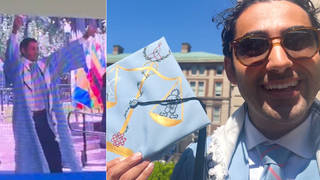
As the school year begins, New York City Mayor Bill de Blasio is launching his signature initiative of full-day universal prekindergarten at public schools. More than 50,000 children have already enrolled, and thousands of additional teachers have been hired. Democracy Now! co-host and New York Daily News columnist Juan González discusses how the program could transform public education in New York City, and potentially nationwide.
Transcript
AMY GOODMAN: Juan, before we move on with our first segment, you have a very interesting column in the New York Daily News today.
JUAN GONZÁLEZ: Yes, well, I reported today on the—what is about to happen in New York City, one of the biggest and most ambitious experiments in reforming public education in years in the United States. Starting next week, New York will be offering free full-day prekindergarten classes to children in New York City. Until now, there’s only been a small, mostly half-day pre-K program. But the signature initiative of the new de Blasio administration is this universal pre-K. Effectively, it adds an entire year to the school year of any child in the public schools, because they’ll start school at four instead of five in kindergarten.
And yesterday the mayor announced that 50,000 children have already registered for the new pre-K programming. That’s an immense number when you think about it. The entire public school system of Seattle is only, I think, about 47,000 or 48,000 children. And the city is actually adding 30,000 new children. There were 20,000 in pre-K last year, which is almost equal to the public school system—the entire public school system of Cincinnati. So this is a huge endeavor.
Thousands of teachers have been hired and trained. Hundreds of sites in both community organizations and public schools have been identified. And they’ve had to rush this all out only since March, which is when the Legislature, the state Legislature, approved funding for the program, after de Blasio lobbied fiercely for it. And so, it’s a major, major change, not to mention the fact that countless numbers of parents, who until now have had to pay for child care for their four-year-olds, will now not have to worry about this extreme, this large cost in their budgets of private childcare. So, it’s a major change. And if it succeeds, you may see cities across the country moving toward universal pre-K, full-day pre-K. So it’s going to be an interesting experiment. There are bound to be all kinds of problems initially with it, but I know that educators and reformers around the country are looking to see what happens with this pre-K program.
AMY GOODMAN: We’ll continue to follow it.












Media Options